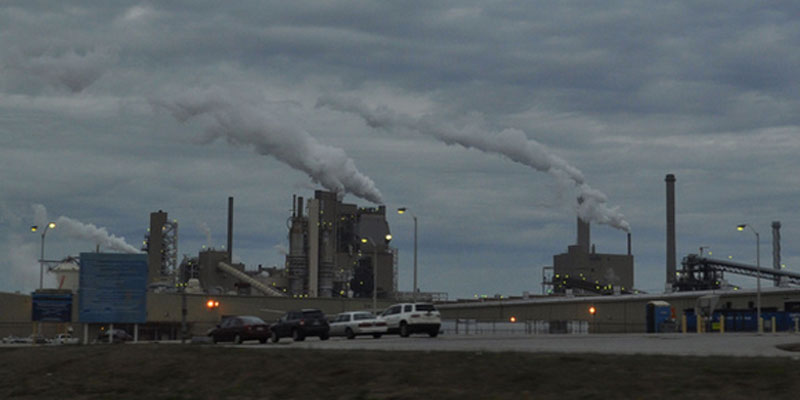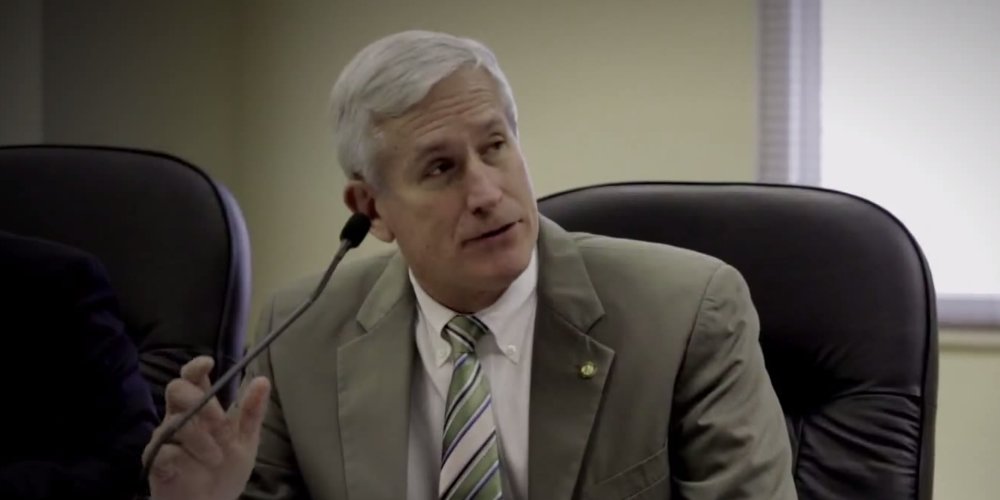
Major industry comes to small-town Alabama
“An Act to Establish the Town of Courtland, in Lawrence County” was passed by the Alabama Territorial Legislature on December 13, 1819.
Wealthy planters quickly set up shop in the town. One of the South’s first railroads was built to run through Courtland so their crops could be shipped without having to traverse the hazardous Muscle Shoals of the Tennessee River. The railroad was mostly destroyed during the Civil War, but was rebuilt and became part of the southern rail system around the turn of the 20th century.

In the early 1970s, Champion International Paper, one of the largest pulp and paper companies in the world, erected a mill in Courtland. To say the mill has been a major source of employment for the town would be an understatement. It was bought out by International Paper in 2000, and today the mill employees more people than actually live in the town. Over 1,100 Alabamians count on the mill to provide for their families. Less than 1,000 people live in Courtland, which consists of a little over 300 households.
From undisputed paper king to borderline paper tiger
Around the same time the Courtland railroad was rebuilt and put back into operation after being destroyed during the Civil War, 18 pulp and paper mills in the northeast United States merged to form International Paper. At the time, IP supplied an incredible 60 percent of the country’s newsprint.
Their famed Hudson River Mill revolutionized the paper industry, serving both as the company’s headquarters and as one of its largest plants. After World War II, workers in the Hudson River Mill perfected the production of coated papers. They shifted the company’s focus off of newsprint and on to the growing coated papers market, which exploded with the rise of U.S. service industries and the growth of the American middle class.
Today, 115 years after its founding, International Paper remains the king of the paper industry, employing over 60,000 people worldwide with revenues north of $26 billion a year.
But in spite of its imposing size, significant assets and global workforce, International Paper is struggling to overcome simple free-market economics — supply and demand.
The market for uncoated paper in the U.S. has been declining since 1999. In recent years, that decline has turned into a free fall.
In 2005, International Paper implemented an aggressive restructuring plan that resulted in the sale of over 6 million acres of forestland in the United States. They also shed their coated paper and beverage packaging businesses, along with other holdings.
IP still maintains a massive global empire, but it’s hard not to see their shuffling as little more than rearranging the deck chairs on the Titanic.
Sept. 11 hits home
9/11 is synonymous with tragedy for most Americans.
But for long-time IP workers in Courtland, 9/11 takes on an even more personal meaning.
“I went to work that morning like I have for just about as long as I can remember,” an IP worker told Yellowhammer. He asked to remain anonymous because he said he wasn’t interested in “more reporters calling [his] house after they read [his] name.”
We’ll refer to him as James.
James is in his mid-30s and has been working at International Paper’s Courtland mill since graduating from high school. He worked other jobs growing up, but IP is the only “career job” he’s ever had.
James and his wife have three kids. She works part-time, and they’ve never quite been able to reach their goal of her staying at home to raise the kids full-time until they graduate high school.
“They told us the morning of 9/11 that we were done — the plant was through,” James recalled. “My first thought was ‘my kids won’t be able to go to college.’ I mean, there are more pressing things than that, obviously. I’ve got to pay these bills. I’ve got to put food on the table. But every parent worth their salt is doing what they do in hopes of giving their kids a shot they never had — to give them the chance for a better life.”
With only a high school diploma and few manufacturing jobs available, James is facing the prospect of uprooting his family.
“I’ve got to find out where the work is,” James said. “I ain’t never took a dime from the government and I ain’t about to start now. Listen man, I didn’t know what stress was until Sept. 11, 2013. It’s a sad day for the whole country, and I ain’t trying to compare losing my job to people losing their lives, but this hit home.”
State leaders get the news
“These decisions are especially difficult because of the impact to long-serving and hard-working employees, their families and the surrounding communities,” said International Paper Chairman and CEO, John Faraci. “This decision to permanently close capacity is primarily being driven by demand decline for uncoated freesheet paper products in the United States.”
IP will begin laying off workers gradually over the next few months, with complete work stoppage set for sometime early next year.
There are two potential scenarios that could play out when a major employer decides to close up shop.
In the first scenario, the Department of Commerce is told in advance.
The state then uses whatever resources it can muster to convince the company to stay open. Sometimes that means economic incentives — whether they come directly from the state or in partnership with local governments — other times it means jobs training and recruitment.

“We’ll work with the company any way we can to help them remain operational,” Commerce Secretary Greg Canfield told Yellowhammer. “We immediately launch an exploration to find out what conditions have led to the situation. We open a dialogue with senior-level management and find out if there is anything the state can do to assist them.”
In the second scenario, state government officials are given no advance notice — they’re blindsided.
International Paper’s closing falls into scenario number two.
But even though IP did not reach out to the state for assistance, Canfield said they engaged immediately after finding out about the company’s plan to close the Courtland mill.
“Governor Bentley reached out to IP’s CEO,” Canfield said. “[The CEO] made it clear that there wasn’t a pathway forward to keep the plant open.”
Canfield said the state also searched for scenarios in which the equipment at the IP mill could be repurposed to create a different, more sustainable business model.
No luck.
“The company had already gone through a repurposing exercise to find other uses for the plant. They looked at the life of the plant, the equipment and the costs of modifying what they had for another purpose. There was no business case to be made for doing that, even if the state offered incentives, which it did.”
Canfield said the Commerce Department even offered to pursue extraordinary measures, like seeking approval from the legislature to incentivize IP at a level higher than the Commerce Department is currently authorized.
“Even that went nowhere,” he said. “We’re fighting market forces that are out of everyone’s hands. Market conditions led to the situation IP Is in. We can’t help them get customers in a declining market that’s projected to continue to decline. They don’t need incentives, they need customers to buy their products.”
The ripple effect
Sen. Paul Bussman, R-Cullman, and Rep. Ken Johnson, R-Moulton, are Courtland’s current representatives in the Alabama legislature.
“What people don’t see is the jobs outside of IP that are affected as well,” Rep. Johnson told Yellowhammer. “There were contractors out there every day, people selling diesel fuel, the little lady selling biscuits every morning at the nearby gas station. This impacts everyone in the community, whether they actually work at the mill or not.”
Sen. Bussman echoed Johnson’s assessment of the ripple effect the mill’s closing could have on the local economy.
“You’ve got hundreds of people — loggers, truck drivers — they’re bringing in 175 to 180 loads every day. We have a tremendous forestry industry that now has no place in the area to sell its timber.”
The “wood supply chain,” as it is known, consists of loggers and wood dealers that supply wood to the mill, the truckers that deliver the wood, and the landowners who grow the timber.

In spite of the market conditions that led to the Courtland mill being shut down, the forest industry in Alabama is actually showing signs of growth. The Alabama Department of Commerce listed 31 new forestry-related projects with a total investment of $303 million, creating over 1,200 jobs in 2012 alone.
Still, there’s no way to sugarcoat the negative impact the closing of the mill will have on northwest Alabama communities and on members of the forestry community that depend on the jobs and markets created by the mill.
“This facility has been a vital part of the forestry community in northwest Alabama for decades and its closure represents a real loss for the local communities and for Alabama as a whole,” said Chris Isaacson, Executive Vice-President of the Alabama Forestry Association. “The impact will be felt not only by the employees, but also by the entire wood supply chain including forest landowners, loggers, truckers and all of the suppliers and vendors that provide support.”
A pathway forward
“We’ve started discussions with economic development people to see how we can make this a soft landing,” Sen. Bussman said. “Hopefully the state can help retrain some of the workers. We’re in discussions with Secretary Canfield, the Alabama Department of Economic and Community Affairs (ADECA) and others who can help in those areas. Rep. Johnson and I are going to work every day on bringing new industries to the area.”
House Speaker Mike Hubbard and Rep. Johnson held a press conference last week during which they announced plans to provide resources to IP workers and other people in the area affected by the mill’s closing.
Governor Bentley’s “rapid response team” is set to visit the plant this week to help employees find new jobs and training.
“You may have people who have been employed out there such a long time that a high school education was not required,” Johnson said. “And now we may need to help them with their GED or we may need to help them with further training. That’s just part of what they’ll do. There’ll even be credit counseling made available to some who will need that.”
Secretary Canfield said the Dept. of Commerce has already begun looking at their existing book of projects to introduce them to Lawrence County. He also said they are “casting a wide net” to find companies considering projects that might find the current International Paper location suitable to their needs.
“These are longterm solutions, but we’re already working on them while the Department of Labor, ADECA and others on our team work to meet the immediate needs,” Canfield said.
Back in Courtland, James, the long-time International Paper employee, huddled with his family and friends at a local church and prayed for guidance.
“We’ve done all the crying we’re going to do, and believe me, there’s been a lot of that,” James said. “Now we’re crying out to the Lord and finding our hope in Him. There ain’t much hope to be found anywhere else right now.”
Follow Cliff on Twitter @Cliff_Sims








